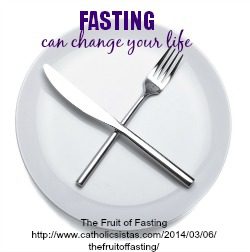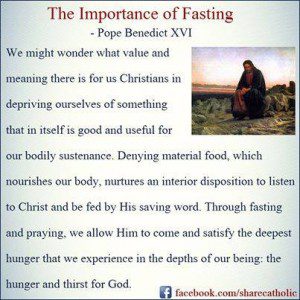 Today is the second day of Lent, which hopefully means that most of us are still gung-ho about our Lenten commitments, and are excited about the spiritual growth we hope to achieve in the coming weeks. Either that, or we’re relieved that Ash Wednesday is over so we can have the hamburger we were craving all day yesterday (and thankful that fasting no longer is required for all 40 days). Maybe it’s a little bit of both. I know that’s how I’m feeling. Every year I’m a bit split in my feelings about Lent. I am grateful for the opportunity provided by this season to grow closer to the Lord and deepen my appreciation for Easter, but I also dread the sacrifice and (minor) suffering required for me to take full advantage of that opportunity. My spirit is willing, but my flesh is weak.
Today is the second day of Lent, which hopefully means that most of us are still gung-ho about our Lenten commitments, and are excited about the spiritual growth we hope to achieve in the coming weeks. Either that, or we’re relieved that Ash Wednesday is over so we can have the hamburger we were craving all day yesterday (and thankful that fasting no longer is required for all 40 days). Maybe it’s a little bit of both. I know that’s how I’m feeling. Every year I’m a bit split in my feelings about Lent. I am grateful for the opportunity provided by this season to grow closer to the Lord and deepen my appreciation for Easter, but I also dread the sacrifice and (minor) suffering required for me to take full advantage of that opportunity. My spirit is willing, but my flesh is weak.
The weakness of our flesh – in this case, the difficulty we have in doing spiritually beneficial things such as fasting – is one reason that the Catholic Church and its rules, rituals, and liturgical seasons, is such a gift. I know that a lot of our Protestant brothers and sisters do not understand being required to fast or abstain from meat. They don’t understand the command of the Church to set aside the 40 days of Lent for making an extra effort in the areas of prayer, fasting, and almsgiving. Even many Catholics do not understand. Why do we need the Church to tell us to do these things? If we are going to fast, pray, and give, shouldn’t it come from our hearts rather than a sense of duty?
I concede that it would be better if we were entirely internally motivated and were not behaving simply out of obedience to Church rules when we do good works. I wish that I were more internally motivated to do a lot of things. I’ve always been the kind of person who is very high-achieving and well-behaved when there is someone/something imposing requirements on me. I respond well to rules and threats of consequences. I work well under pressure and with a deadline looming. But I’m not as good at doing something just because it’s what’s best. I confess, this is because I have an undisciplined will. It’s difficult for me to say no to myself when I can’t see the immediate consequences of saying yes. This is a weakness in my character and spiritual development, but being motivated by rules and consequences is still a praiseworthy step on the way to peak moral development – doing things solely out of love for God.
 The Catholic Church understands this. Even if it’s not the highest good to do something because you were told to doesn’t mean it’s not a good at all. Whether I fast because I independently choose to or because the Church told me to, I can still reap the spiritual benefits of fasting. I will experience the discomfort of hunger pangs, and that little bit of suffering can remind me to turn my attention to the extraordinary suffering of Jesus on the Cross and unite myself to him there. Hopefully I will think about how my own sins led to Jesus’ suffering on the Cross, and offer back my small amount of suffering in reparation. I may think about the people who go hungry every day because of a lack of resources, and become more motivated to serve those in need with my time and money. All of this spiritual growth can happen because the Church told me that I had to fast and I did so out of obedience.
The Catholic Church understands this. Even if it’s not the highest good to do something because you were told to doesn’t mean it’s not a good at all. Whether I fast because I independently choose to or because the Church told me to, I can still reap the spiritual benefits of fasting. I will experience the discomfort of hunger pangs, and that little bit of suffering can remind me to turn my attention to the extraordinary suffering of Jesus on the Cross and unite myself to him there. Hopefully I will think about how my own sins led to Jesus’ suffering on the Cross, and offer back my small amount of suffering in reparation. I may think about the people who go hungry every day because of a lack of resources, and become more motivated to serve those in need with my time and money. All of this spiritual growth can happen because the Church told me that I had to fast and I did so out of obedience.
Abstaining from meat on Fridays and giving up other pleasures during Lent are also forms of fasting, but these practices can seem even more pointless or confusing to some. How does not eating meat or candy help us to grow closer to God, especially if we are giving them up because it’s a Church-imposed season? The truth is that it probably won’t, unless we feel some degree of deprivation when we forego them, and unless we have the proper attitude while we are doing it. Many of us today do not ever have to experience deprivation of any physical comfort. We have everything we need and a whole lot more, and we tend to fill any kind of void that we feel with temporal pleasures (like coffee or chocolate). This experience of always being satisfied — never feeling physical deprivation — can mask our spiritual deprivation, our need for God. Therefore, one benefit of allowing ourselves to feel even a small amount of deprivation from giving up a simple pleasure like sweets is that it makes us more able to recognize what we are lacking in our souls and turn to God, instead of something physical, to fill the void.
Secondly, any sacrifice, no matter how small, can be offered to the Lord as a sign of our love and sorrow for our sins. To an onlooker, it might seem like “just a cup of coffee” that we are forgoing, but in the secret of our hearts, it is a gift to our Beloved, telling him that we love him more than any temporal good – if we choose to see it this way.
Lastly, these small sacrifices ultimately help us to turn away from sin. For so many of us, sin is not a result of malicious intent but a result of weakness of will when it comes to doing what’s right. We know the right thing and even want to do it, but we just … don’t. Practicing saying no to ourselves in little ways, such as not checking our Facebook page, not going for a second helping at dinner, or not drinking our favorite beer when the kids go to bed, strengthens our weak wills. The stronger our wills grow, the more able we are to say no to those things that are truly bad for us. Think of it as a weight-lifting routine – the more repetitions we do with the smaller weights, the more ready we will be for the “heavy lifting.” These “exercises” also carry us further down the path toward doing everything for the love of God rather than out of obligation.
I often have heard people say they are going to forego the traditional practice of giving up something good in favor of adding something, like more prayer time or extra confession. It’s certainly praiseworthy to add in opportunities for spiritual growth (especially prayer, since that is one of the focuses of Lent), but we shouldn’t do it in place of making those small sacrifices of good things. Remember that fasting is one of the three main objectives of Lent, and the fasting on Ash Wednesday and Good Friday are just a small part of that. If we want to be in top spiritual shape in time for Easter, we need those little sacrifices to strengthen our spiritual muscles.
This year, one of the ways I am going to practice saying no to myself is by participating in 40 Bags in 40 Days. I have a hard time getting rid of things, especially if they are in any way useful (even if I’m not using them and probably never will). This tells me that even though I’m not exactly materialistic, I have an unhealthy attachment to “stuff” and I need to break free of it. I am pretty sure that each time I try to put something into a bag to get rid of it, a little voice in my head is going to say “Keep it! Keep it!” and I am going to have to tell it “no.” In doing so over and over during these 40 days, my hope is that I will grow more and more able to say “yes” to God.

